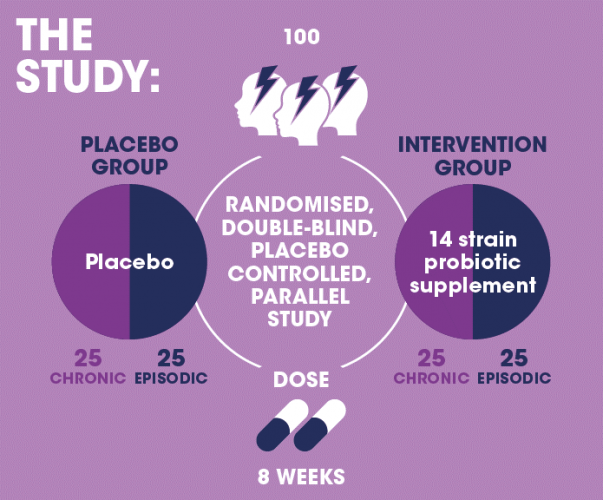Largest ever migraine results published!
Probiotics Shown to Significantly Reduce Frequency of Headaches and Migraine Symptom Severity in the Largest-Ever Published Study
A probiotic supplement containing 14 strains of “gut-friendly” bacteria has been shown to significantly reduce both the frequency and severity of migraine headaches in adults.
In the largest-ever double-blind, randomised placebo-controlled trial1 (the gold standard for medical research) of probiotic supplements in the management of migraine headaches, dramatic improvements have been reported in patients diagnosed with either chronic migraine (CM – people that suffer with headaches >15 days per month) or episodic migraine (EM – people that suffer headaches
• In the study, published in Cephalagia, one of the world’s leading headache journals, 100 patients suffering from migraines (50 CM and 50EM) received either the probiotic Bio-Kult® Advanced (14 bacterial strains; 4 billion CFU per day) or a placebo for 8-10 weeks.

• By the end of the trial, the mean frequency of migraine attacks had significantly decreased in the probiotic groups compared to placebo; 40% in the EM group and 45% in the CM group.
• Migraine intensity was also significantly improved in the probiotic groups compared to placebo; 29% in the EM and 31% in CM.
• In addition, the use of abortive medication was greatly reduced in both probiotic groups and attack duration was also significantly reduced in the CM probiotic group.
The study, conducted by Dr. S. R. Jahromi and colleagues, from the Iranian Center of Neurological Research, Tehran University of Medical Sciences is the first successful trial of its kind to show a beneficial role of probiotics in alleviating the frequency, severity and duration of migraine attacks.
Previous evidence has demonstrated that gut microbiota play a key role in the gut-brain axis and disturbances of intestinal flora may be associated with neurological disorders, including migraine.2 The association between migraines and GI disorders may be explained by numerous mechanisms; one of which may be increased intestinal permeability, which allows leakage of bacterial compounds (endotoxins) into the bloodstream, thus triggering inflammation and possible migraine attacks.
Leading experts are encouraged by the research findings, which they believe are a significant breakthrough in understanding the role live bacteria and the gut play in the management of migraine headaches. “There is certainly a link between migraine and the functioning of the gut, as many sufferers tell us at the National Migraine Centre about their digestive symptoms” says Dr Katy Munro, headache specialist at the National Migraine Centre. “It is an interesting new approach to look at better gut health by the use of probiotics. This small study suggests further research is necessary and we look forward to seeing the results of a larger scale trial.”
Professor Glenn Gibson, professor of food microbiology at the University of Reading, and leading gut health expert continues, “We are finding out more and more about the role of the gut microbiome in health and disease. As long ago as the 1800's, Arbuthnott Lane - a Scottishphysician suggested that the gut could be involved in migraine and schizophrenia, these predictions were not taken seriously, at the time, but they are now. The gut microbiome is central to many disorders which previously we did not feel were linked. Principle among these are cognitive issues with anxiety, depression, autism and dementias all on the research agenda. This excellent study shows how alteration of the microbiome through a safe and efficacious probiotic mixture can positively help migraine suffers. This brings such hope to the millions of sufferers in the UK. Knowing that our gut microbiome can be changed with such interventions is a major area of research with massive clinical implications. I especially liked the mechanistic science that underpinned the research done here.” says Professor Gibson.
Dr Ashton Harper, Medical Director at ADM Protexin Healthcare adds, “This ground-breaking trial is the first of its kind to show that an oral live bacterial product is capable of improving multiple aspects of migraine headaches. These results support exciting research developments in the microbiome-gut-brain axis - the bidirectional communication between the gut and brain - which have identified the fascinating potential of our gut bacteria to influence neurological health and disease. The single most meaningful result of this current study was the substantial reduction in frequency of migraine attacks for those taking the probiotic. Although this area of probiotic research is relatively novel, and further confirmatory studies are required, it does hold promise for improving multiple symptoms in one of the world’s most disabling illnesses”.
“Any research that could potentially help a migraine sufferer is always welcome” concludes Dr Fayyaz Ahmed from the department of neurology, Hull and East Yorkshire Hospitals NHS Trust. “This research opens new doors for further research into the link between Nervous System disorder and Gastrointestinal structures”
- Bio-Kult® contains 14 strains of probiotics including: Bacillus subtilis PXN 21, Bifidobacterium spp. (B. bifidum PXN 23, B. breve PXN 25, B. infantis PXN 27,B. longum PXN 30), Lactobacillus spp.(L. acidophilus PXN 35, L. delbrueckii spp. Bulgaricus PXN39, L. casei PXN 37, L. plantarum PXN 47, L. rhamnosus PXN 54 , L.helveticus PXN 45,L. salivarius PXN 57) Lactococcuslactis PXN 63, Streptococcus thermophilus PXN 66].
References
[1]. Martami, F., Togha, M., Seifishahpar, M et al The effects of a multispecies probiotic supplement on inflammatory markers and episodic and chronic migraine characteristics: A randomized double-blind controlled trial. Cephalalgia.Jan 2019
2. van Hemert S, Breedveld AC, Rovers JMP, et al. Migraine associated with gastrointestinal disorders: review of the literature and clinical implications. Front Neurol 2014; 5: 241.
3. Migraine - National Library of Medicine - PubMed Health. https://www.ncbi.nlm. nih.gov/pubmedhealth/PMHT0024778/ (accessed April 23, 2018).
4. Steiner TJ, Stovner LJ, Birbeck GL. Migraine: the seventh disabler. J Headache Pain 2013; 14: 1.
5. Steiner T, Scher A, Stewart W, Kolodner K, Liberman J, Lipton R. The Prevalence and Disability Burden of Adult Migraine in England and their Relationships to Age, Gender and Ethnicity. Cephalalgia 2003; 23: 519–27.
6. All-Party Parliamentary Group on Primary Headache Disorders. Headache Disorders - not respected, not resourced. 2010; : 1–26.
7. Kristoffersen ES, Lundqvist C. Medication-overuse headache: epidemiology, diagnosis and treatment. Ther Adv drug Saf 2014; 5: 87–99.
8. Shaik MM, Gan SH. Vitamin Supplementation as Possible Prophylactic Treatment against Migraine with Aura and Menstrual Migraine. Biomed Res Int 2015; 2015: 1–10.
9. Panerai AE. Is migraine a disorder of the central nervous system? Neurol Sci 2013; 34: 33–5.
10. Aggarwal M, Puri V, Puri S. Serotonin and CGRP in migraine. Ann Neurosci 2012; 19: 88–94.
11. Maleki N, Becerra L, Borsook D. Migraine: maladaptive brain responses to stress. Headache 2012; 52 Suppl 2: 102–6.
12. Alpay K, Ertas M, Orhan EK, Ustay DK, Lieners C, Baykan B. Diet restriction in migraine, based on IgG against foods: a clinical double-blind, randomised, crossover trial. Cephalalgia 2010; 30: 829–37.
13. Bruno PP, Carpino F, Carpino G, Zicari A=. An overview on immune system and migraine. Eur Rev Med Pharmacol Sci; 11: 245–8.
14. Malhotra R. Understanding migraine: Potential role of neurogenic inflammation. Ann Indian Acad Neurol 2016; 19: 175–82.
15. Bond DS, Roth J, Nash JM, Wing RR. Migraine and obesity: epidemiology, possible mechanisms and the potential role of weight loss treatment. Obes Rev 2011; 12: e362-71
16. Chai NC, Peterlin BL, Calhoun AH. Migraine and estrogen. Curr Opin Neurol 2014; 27: 315–24.
17. Cavestro C, Rosatello A, Micca G, et al. Insulin Metabolism is Altered in Migraineurs: A New Pathogenic Mechanism for Migraine? Headache J Head Face Pain 2007; 47: 1436–42
18. Allais G, Castagnoli Gabellari I, Airola G, Borgogno P, Schiapparelli P, Benedetto C. Headache induced by the use of combined oral contraceptives. Neurol Sci 2009; 30: 15–7.
19. Lin Y-K, Lin G-Y, Lee J-T, et al. Associations Between Sleep Quality and Migraine Frequency: A Cross-Sectional Case-Control Study. Medicine (Baltimore) 2016; 95: e3554.
20. Sadeghi O, Maghsoudi Z, Askari G, Khorvash F, Feizi A. Association between serum levels of homocysteine with characteristics of migraine attacks in migraine with aura. J Res Med Sci 2014; 19: 1041–5.
21. Panconesi A, Bartolozzi ML, Guidi L. Alcohol and Migraine: What Should We Tell Patients? Curr Pain Headache Rep 2011; 15: 177–84.
22. Lee MJ, Choi HA, Choi H, Chung C-S. Caffeine discontinuation improves acute migraine treatment: a prospective clinic-based study. J Headache Pain 2016; 17: 71.
23. Mauskop A, Varughese J. Why all migraine patients should be treated with magnesium. J Neural Transm 2012; 119: 575–9.
24. van Hemert S, Breedveld AC, Rovers JMP, et al. Migraine associated with gastrointestinal disorders: review of the literature and clinical implications. Front Neurol 2014; 5: 241.
25. Martami F, Ghorbani Z, Abolhasani M, et al. Comorbidity of gastrointestinal disorders, migraine, and tension-type headache: a cross-sectional study in Iran. Neurol Sci 2018; 39: 63–70.
26. van Hemert S, Breedveld AC, Rovers JMP, et al. Migraine associated with gastrointestinal disorders: review of the literature and clinical implications. Front Neurol 2014; 5: 241.
27. van Hemert S, Breedveld AC, Rovers JMP, et al. Migraine associated with gastrointestinal disorders: review of the literature and clinical implications. Front Neurol 2014; 5: 241.
28. Perrier C, Corthésy B. Gut permeability and food allergies. Clin Exp Allergy 2011; 41: 20–8.
29. Bischoff SC, Barbara G, Buurman W, et al. Intestinal permeability--a new target for disease prevention and therapy. BMC Gastroenterol 2014; 14: 189.
30. Bermudez-Brito M, Plaza-Díaz J, Muñoz-Quezada S, Gómez-Llorente C, Gil A. Probiotic Mechanisms of Action. Ann Nutr Metab 2012; 61: 160–74.
- 13th May 2019

